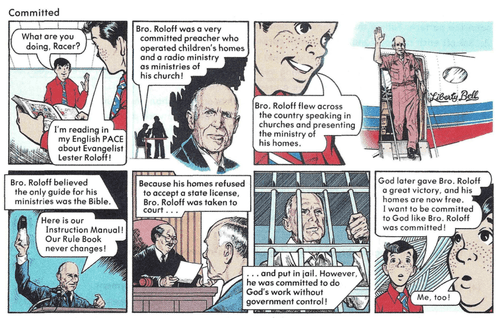
What follows is part three of a series by ElectroMagneticJosh, a man whose parents were Evangelical missionaries. This series will detail his life as a Missionary Kid (MK).
Part 4: The second part of my education
Section 1
Something I should have made clear in the last part was that this is not just an overview of my education but also of my time as an MK. It is a good way to give the “big picture” of my life before I delve into more specific issues and thoughts.
In my own mind I tend to compartmentalize my MK experience as being in two distinct parts. It is easy to formulate this distinction purely because of the time spent back in New Zealand (2 ½ years) before my family returned again – at which point I was older and have clearer memories.
It goes further than the time elapsed between living there though. The first part of my MK life was spent living in small towns (where my parents were involved in church planting) and being home-schooled. The second part was a very different experience. Nothing was going to be same; not my location, my education or my parent’s ministry.
Before I dive into those differences, however, this part of my story will begin with a setup.
Section 2
After my parents both fell ill and needed to return to New Zealand, I found myself in a place I rather liked. My family was living in a semi-rural village on the outskirts of Auckland (the biggest city in NZ) while still being no more than a half hour drive to the CBD (unless there was traffic). My father was a full-time school teacher and my mother a home-maker. I had a lot of friends both locally through my school and further afield (but not by much) through the church we belonged to. I also had both sets of grandparents and a few aunts, uncles and cousins all living in close proximity.
Cue the nostalgia-infected idealized version of childhood.
Life may not have been 100% perfect, but for me, at that time, they seemed to be going great. I saw no reason why this life of mine wouldn’t continue on a predictable trajectory. I saw myself living at the family home until I was an adult and got a job, went to university, or got married (those were the only three reasons I couldn’t imagine leaving home for at the time). I want to make it clear that I was very content and did not expect or want things to change.
So when my parents called a family meeting I was not happy with what was to come. They had been giving it some thought and my father wanted to be involved in Christian ministry again. And they had two options they were considering: 1) Return to the Philippines or 2) Take a Pastoral position in Auckland.
To me it seemed obvious – do the Pastor thing. Then they hit me with the bombshell; the position was on the exact opposite side of the city about a 1 hour drive on a good day. I would have to move house, change school and make a completely new set of friends. While my younger siblings seemed to accept these changes meekly, I was stuck between two terrible options. At 10 years old I felt like my whole world was getting taken away from me and there was nothing I could do.
I pleaded with them to consider option 3: stay where we are and not move anymore. Or option 4: they move away but I move in with my grandparents. I am not sure how my parents felt about their oldest child wanting to emancipate himself from them but, in the end, the decision was made and back to the Philippines it was.
Section 3
My parents were not going to be doing the exact same thing as they did before. My father, along with some Filipino church leaders and missionaries, had come up with a different concept for church planting. They would train a team of Filipinos to be church planters. First they would study (theology, evangelism techniques and the like) and then they would be sent on a mission to plant a church. My father would co-ordinate their education and monitor the team’s progress. Support for these church planters would be raised from overseas (NZ, Australia, Canada and the USA) so that they could devote several years to the endeavor.
As a result my father would need to be based in a central location and the capital city of Manila was selected. This meant I and my two siblings (my sister was born six years prior) would not be home-schooled. We were to go to a Christian International School called Faith Academy.
Founded in 1956 by missionaries from several different organizations and denominations, Faith Academy (to be known as “FA” for the duration of this post) is a K-12 school offering a US-based curriculum as well as GCSEs for British and other commonwealth students. According to Wikipedia, its current enrollment is around 600 students at the Manila campus with a further 150 studying at a smaller mission school in Davao which is in the south of the Philippines. I am too lazy to confirm if these numbers are consistent with my own time there but they seem close enough.
I would be a student at FA for six years in total, which comprised grade six through to my graduation as a senior. Some of you may have noticed that there was a year unaccounted for – I spent grade 10 back in NZ before returning for my final two years. I graduated in 1998 and returned to New Zealand marking the official end of my life as an MK.
Section 4
If the above section seemed brief – don’t worry, I do have a lot to say about FA and its own unique culture in the future. This post is just to give an over-view of life and, hopefully, provide context for future thoughts. I will just deal with a couple of differences between FA and NZ schooling.
New Zealand, being in the southern hemisphere, has its summer break over Christmas. As a result, the new school year begins around the start of February so it actually follows a complete year. When I left NZ I was half-way through the equivalent of sixth grade but started FA at the start of the new school year. Down the line it meant all my age-peers in NZ would finish high school six months earlier than me.
This idea didn’t bother me at all until I returned to NZ for a year and rekindled some of my old friendships. Suddenly the thought that they would be working or starting university six months earlier than me really bothered me. This now seems like such a trivial difference to dwell on but, as a high-school kid, these things really mattered.
Ironically the difference that had a much bigger impact on my life’s trajectory was the one I didn’t think much of at the time. Teachers at FA openly discussed god and their beliefs/theological views in the class-room – regardless of the subject. For someone who had come from a very secular country this felt very refreshing at first. Bible was now a subject we took along with Math, English, History and Science. Our weekly school assemblies were now a chapel time (complete with worship) and I felt my teachers were people I could trust in a way I hadn’t felt before – because they had “God’s truth” in them just like me.
After a while this became mundane and I started taking it for granted. Like others who attended missionary schools (or Christian schools in general) this just became another part of my education. I only realized just how much bible education I had received when the family returned to NZ for a year. Apart from the shock that public high-school brought me (kids and teachers would swear – oh no), I realized that I was far more bible literate at 15 than most of the youth group I attended and even many of the adults in the church.
This year back also brought a change in me personally. I still don’t fully know why, but when I returned to FA for my final years of High School I felt more certain of God and Christianity. Maybe it was a reaction to the secular school system that convinced me that “God’s way” was better. Perhaps it was how welcome I felt by the people in our home-church and the knowledge that I would see them again in a couple of years. It might even have stemmed from an arrogance that had been building inside me – the view that my knowledge and my experiences made me unique and would lead me to do mighty things for God (yes, it’s embarrassing to look back on now).
Whatever it was, when I graduated I was certain of God, His word and my faith. I had strong convictions that I was certain were right. I knew that whatever I did and wherever I went I would do so by God’s grace and following his lead. If 18-year-old-me knew that I would end up with a radically different perspective he would have been upset and, very likely, scared for his future.




